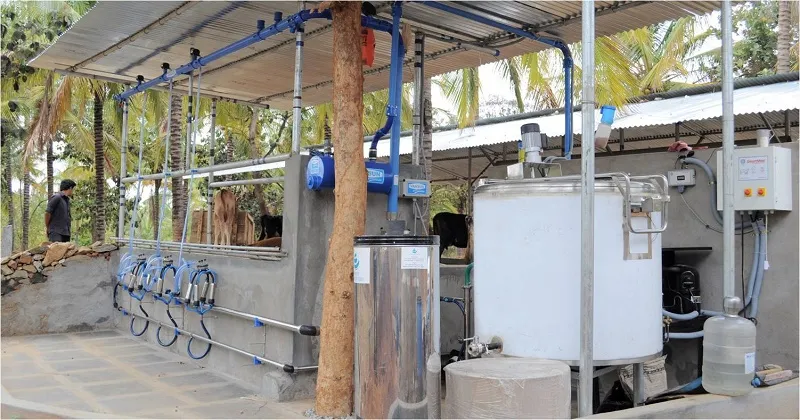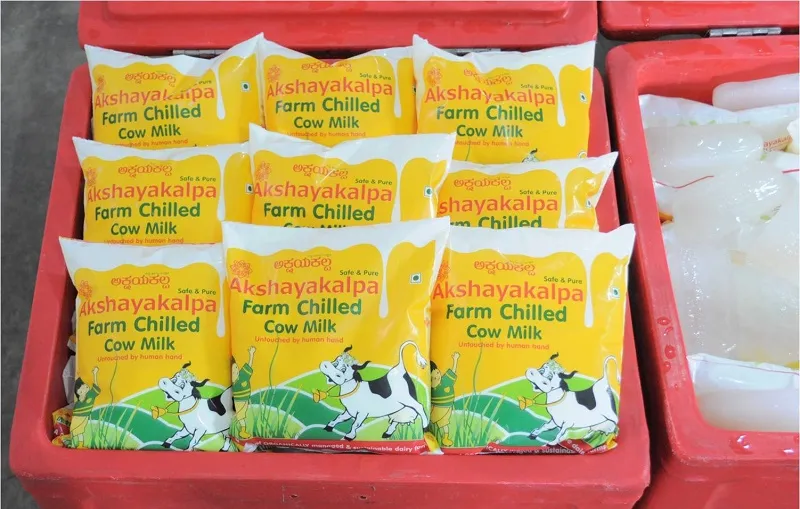Akshayakalpa Farms – how IT professionals are turning into farm-based entrepreneurs in Karnataka’s Tiptur
Around 150 km from India’s Silicon Valley, Bangalore, several IT professionals are returning to their roots – the farms where they spent a significant amount of their childhood, wanting to escape to the cities. As farm-based entrepreneurs, they are successfully managing organic, sustainable, rural dairy farms – each of which gives them an earning of Rs 40, 000 – Rs 1, 00, 000 each month! An innovation by veterinary expert Dr. GNS Reddy, Akshayakalpa Farms and Foods Ltd. is one of India’s first private initiatives that incubates rural entrepreneurship by radically redefining dairy processes. The benefits include providing high-quality and nutritious milk to the end beneficiaries, boosting economic benefits for farmers, bringing technology that is bridging the urban-rural divide, and helping reverse urban migration.
The story behind Akshayakalpa Farms

Deeply inspired after a lecture by Dr. Manibhai Desai, a Gandhian who pioneered rural development in India and founded Bharatiya Agro-Industries Foundation (BAIF), Dr. Reddy decided to work with Dr. Desai in BAIF – a stint that lasted nearly two decades and led to significant innovations in the areas of forestry, irrigation, and watershed management.
When Dr. Reddy couldn’t incubate the Akshayakalpa model within BAIF owing to certain constraints, he decided to turn in to an entrepreneur. In 2010, he founded Akshayakalpa farms with an upfront investment of Rs 25 crore in Karnataka’s Tiptur district to realise his dream “to create wealth in villages, to empower the disempowered.”
Dr. GNS Reddy says,
A paan-wallah, who sets up his shop in a 3×3 space, earns more monthly than a farmer who owns a 3 acre farm, growing coconuts. This needs to change.
Current status of India’s dairy market
The good news is that India’s organised dairy sector has been growing at 22 per cent annually for the last five fiscals i.e., 2011-15 and is expected to rise to as much as 25 per cent by FY 2017-18 from the recent 19 per cent in FY 2014-15 (CRISIL Report). But the bad news is that as much as 70 per cent of the milk sold in the market is adulterated and unfit for consumption (National Survey of Milk Adulteration 2011). As Dr. Reddy rightfully questions,
Where is the value for the money a customer has spent if even before the milk reaches them, most of its nutritional content is lost?
He credits this to the incorrect focus in the dairy system, to the quantity vs quality debate, which often overlooks the health of the cows – a prime factor in producing good quality milk. For instance, by tying cows in congested areas and limiting their freedom to graze on the fields, by feeding them artificial factory-made fodder such as groundnut cakes, by injecting steroids and artificial hormones – the milk productivity definitely increases, but every harmful chemical makes its way in to the glass of milk finally consumed.
But isn’t pasteurising the milk a way to ensure this doesn’t happen? Dr. Reddy says, “Milk is pasteurised because most farmers cannot afford to have in-house chilling units. But the process destroys many vital elements such as vitamin A, B6 and B12, calcium and iodine.”
“The milk is more or less dead.” And this is where Akshayakalpa farms step in as a welcome change.
The model and the differentiator

An initial investment of approximately Rs 20-25 lakhs is required to set up a full-fledged Akshayakalpa farm, which would comprise 20 – 25 cows, an advanced cowshed, an automated milking system, fodder chopper and chilling unit, bio-gas plant and generator. The entire farm is completely automated. Apart from this, a key differentiator is that the company places greater emphasis on the cows’ health.
Dr. Reddy says, “All cows are stress-free and have the freedom to graze whenever they like. Their sheds are cleaned regularly – limiting the risk of diseases and every single cow is monitored electronically for its health and overall milk production regularly.”
As for the cows’ nutrition, he says, “A mix of organic fodder; monocots (maize, ragi and local jowar) and dicots (cow pea and velvet beans) along with tree fodder (moringa), all of which are grown organically by the farmers themselves, are fed to the cows.”

In the ‘udder to cap’ automated technology, right from milking the cow to chilling it, everything is done through machines without the touch of a human hand, eliminating the need for pasteurisation completely. As a move towards sustainability, cow dung and urine are diverted to the biogas plant, which effectively produces enough methane gas that can operate the entire technology in the farm for eight hours every day, largely reducing the dependency on the state’s power grid, which is often a challenge in the rural areas.
How are the processes benefiting?

The processes are benefiting in many ways for all stakeholders –
- The farmers are typically earning anywhere between Rs 40, 000 – Rs 1, 00, 000, depending on the scale of their farms. This salary is at par with a person living and working in a city.
- The cows are healthy and happy, which has resulted in increasing the national average of milk production from 2.5 litres per cow per day to 10 litres per cow per day.
- The glass of milk that the consumer drinks everyday contains over 60 digestive enzymes and immunoglobins, amino acids and proteins – all vital for the body’s overall functioning and development, in addition to being completely digestible. Apart from this Akshayakalpa also produces a wide range of milk products such as paneer, curd, ghee and butter.
Where next?
With the current level of success and acceptance, Dr. Reddy feels like he is “living a dream”. And why not? He started with the firm belief that
farmers are capable of contributing to the growth of the economy like anyone else.
And that belief led to the establishment of 110 farms, which cumulatively produce 7, 000 litres of milk, every day!
In the next six months, Dr. Reddy wants to scale up to 200 farms and 30, 000 litres of milk. His bold idea has attracted investments from TATA Capital and a few nationalised banks are also responding. More importantly, he has gathered a carefully selected group of 10 ex-IT people who want to venture in to rural farming by giving interest-free loans as well as working closely with the farmers to accelerate their outputs. This, Dr. Reddy says is his next step, a move to “bridge the urban-rural divide.”










![[Funding alert] Data security startup Seclore raises $27M; VenturEast exits with 17.5X return](https://images.yourstory.com/cs/2/11718bd02d6d11e9aa979329348d4c3e/funding-1645511711142.jpg?mode=crop&crop=faces&ar=1%3A1&format=auto&w=3840&q=75)
![[Funding alert] Maths learning app Countingwell raises Pre-Series A round](https://images.yourstory.com/cs/2/11718bd02d6d11e9aa979329348d4c3e/Imagewf2p-1607509774638.jpg?mode=crop&crop=faces&ar=1%3A1&format=auto&w=3840&q=75)